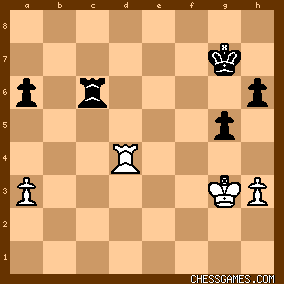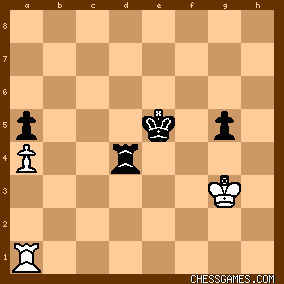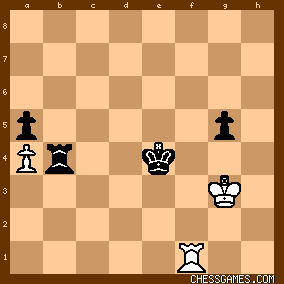|
< Earlier Kibitzing · PAGE 3 OF 8 ·
Later Kibitzing> |
| Jan-29-05 | | euripides: <ugh> I didn't know there was a story there. I thought he beat everyone and won the tournament, no ? |
|
Jan-29-05
 | | keypusher: <euripides>, I believe <ughaibu> is referring to capablanca offering each of his opponents in the last cycle a draw in advance. He got a superior position against Nimzowitsch in that cycle anyway and supposedly passed him a note saying "please make better moves. I don't know how I can avoid winning." He found a way. I know Botvinnik has said that he prearranged draws on occasion. Hard to believe he would say that if it was a clear violation of the rules. concerning rookfiles' latest, I don't know about 1948, but I was flipping through my copy of the Zurich 1953 tournament book this morning, and at least at a quick glance it doesn't look like the Soviets were giving each other "rest days" before they played Reshevsky. In the late rounds, I noticed that Keres hammered Boleslavsky, using a prepared novelty, the round before Boleslavsky played Reshevsky (who beat him); Keres did everything in his power to beat Kotov the round before Kotov played Reshevsky (Kotov escaped with a draw and then beat Reshevsky); and, of course, Keres tried to beat Smyslov the round before Smyslov played Reshevsky (Smyslov beat both men). I'll have to see if other players followed the same pattern. Keres' own account of Zurich 1953 tournament in "The Quest for Perfection" contains no hint of chicanery, but I realize that won't mean much to the skeptics. The one game that makes me wonder is Bronstein playing the Exchange Variation of the Ruy against Smyslov. But there are a number of innocent explanations there. One, Bronstein had just beaten Reshevsky in the main line; maybe he thought Smyslov had something worked out against what he had played, just as Keres had sprung something on Boleslavsky. Two, Bronstein spoke slightingly of the main line Lopez in the book, saying it offered few winning chances to white. (The Ruy Lopez and 1 e4 generally weren't played very much at Zurich; I guess it was Tal, Spassky, Fischer and Karpov who brought it back to prominence at the highest levels). |
|
| Jan-29-05 | | euripides: So it's 'how can I draw against this idiot ?' |
|
| Jan-29-05 | | ughaibu: I think in Keene+Divinsky it's claimed that Capablanca ended up dictating the moves to Nimzowitch, if true this casts the rest of the conspiracy business in a pale light. |
|
| Jan-29-05 | | euripides: well it's a characteristically direct solution to a difficult technical problem. |
|
| Jan-29-05 | | ughaibu: Capablanca style? How would Tal, for example, have dealt with the situation? |
|
| Jan-29-05 | | euripides: <ugh> Probably hypnotised the oppponent into a perpetual. |
|
| Jan-30-05 | | RookFile: ughaibu, some of your questions
are really hard to answer. For
example, Reshevsky had moved to America and lived there for a long time, and it's common knowledge that
the Russians placed a premium on
making sure he didn't get match
against Botvinnik. As we saw in 1955,
when he did get a Botvinnik match,
Reshevsky won.
Why wasn't Smyslov throwing games?
Because either Smyslov or Botvinnik
were 'acceptable' winners. Keres was
not, he had played in some German
tournaments in WW 2 and some say
he was nearly executed by Stalin.
Why did Keres win 1 game from Botvinnik? Simple: Botvinnik had already clinched first, Botvinnik
was being a good comrade by throwing
Keres a bone. Keres almost had to
win that game, a Botvinnik 5 - 0 sweep
would have been absolutely ridiculous.
Back to 1953...
Yes, Smyslov wrote an article. And,
it is based on that article that I
know Keres is tell the truth. Why?
Because of Smyslov's 'non-denial denial'.
A 'non-denial denial' happens when
somebody realizes that the other side
is telling the truth, and doesn't
really have facts to rebut what they
are saying. The classic example was
when reporters like Bob Woodward
started writing that Nixon had something to do with the Watergate break-in. What did the Nixon camp have to say? Stuff like: "During these turbulent time, shallow journalism like this is harmful to the country." No, when someone is lying, what you
get from the victim, which is what
Smyslov would be, is a lot of
detail. You get a point by point refutation of the scandalous claims, that makes the accuser look absurd. You would expect Smyslov to write stuff like: - I wasn't in this hotel room on
that date, here's a picture of
me here site seeing, instead.
- So and so wasn't even at the
tournament as my second
- Bronstein had reason to be an
enemy of mine, I never told this
story before, but....
What we get from Smyslov is the
'non-denial denial' instead. |
|
| Jan-31-05 | | ughaibu: If Keres had agreed and drawn with Smyslov, Smyslov would've been half a point worse off. Even if all his susbsequent Soviet opponents lost their games to him Smyslov could not guarantee to finish ahead of Reshevsky, so asking Keres to draw with Smyslov does not make sense. For the same reason asking Bronstein to draw with Smyslov doesn't make sense. Had Bronstein been asked to lose and had he done so a case could be made but as it stands Bronstein is talking nonsense. (See the David Bronstein page, also Geller vs Bronstein, 1953) |
|
| Jan-31-05 | | euripides: <rook> <Yes, Smyslov wrote an article. And,
it is based on that article that I
know Keres is tell the truth. Why?
Because of Smyslov's 'non-denial denial'. >Keres never said he threw any games, to my knowledge; I think this is a typo for Bronstein. In 1953, we have direct testimony from one participant that he agreed a draw because he felt pressured. I've seen no such testimony in 1948. And the scale of what Keres is suggested to have done in 1948 is much greater than Bronstein's agreeing one draw in 1953. So I think the inference from 1953 to 1948 is rather adventurous. Have you read Smyslov's article ? |
|
| Mar-24-06 | | Father Karras: Keres was obliged to throw games to Botvinnik because the latter saved his life during WW2. Smyslov didn't need to throw games to Botvinnik and never did. |
|
| Mar-24-06 | | ughaibu: Unless you can demonstrate both that Botvinnik saved Keres' life and that Keres threw games to Botvinnik, your post is rubbish. |
|
| Mar-25-06 | | talisman: <ughaibu> <how would tal have handled the situation?> very good pt. |
|
Mar-25-06
 | | Pawn and Two: <keypusher: I have read that Golombek was not actually present at the 1948 tournament> In his book, "The World Chess Championship 1948", Golombek states that he attended all of the Hague portion of the event in his capacity as "The Times" chess correspondent. When the event moved to Moscow, he endeavored to follow but was unable to gain a visa. He noted that "The Times" and the USSR were at time having a private war regarding their correspondents being allowed in the USSR. He believes this was the principal reason he was refused a visa. |
|
Mar-25-06
 | | keypusher: <Capablanca style? How would Tal, for example, have dealt with the situation?> Luckily, Tal provides an answer in his account of the conclusion of the 1959 Candidates tournament. After Tal had secured first place by beating Fischer for the fourth time, his second made him promise to offer a draw to his last-round opponent, Benko, on move 12. <At that time my score against Benko was 5-0, and the idea that he might refuse the draw never occurred to me.
....
[I]n the last round, after playing g4 on my 12th move, I kept my word and offered a draw. Benko silently made an answering move, very quickly blundered, and got into a lost postion. On the 21st move [I think he means the 22nd], I could either give perpetual check, or else go into a completely won ending with two extra pawns.I gave perpectual check, and with the quick temper of youth explained my decision to the journalists as follows: "When I want to win against Benko, I win; when I want to draw -- I draw." Today I can only request indulgence, taking into account the fact that I was then only 22 years old, but I should say that from the psychological point of view it would have been easier for Benko if I had won that game...> <My Life and Games>, pp. 123-24. Tal vs Benko, 1959 . Looking at the comments to the game, I see you already know all this, <ughaibu>. |
|
Apr-28-06
 | | keypusher: Here's another article arguing that this game was fishy, but focusing on White's 50th move. http://www.chesscafe.com/text/hans6... |
|
| Mar-16-07 | | RookFile: <acirce: What makes you assume that he must have had this position:
click for larger viewon his analysis board that night? I would indeed find that rather unlikely.> You obvioulsly haven't read Keres's own chapter on the art of adjourned analysis. If you had, you would know how deeply Keres analyzed adjourned games, and you wouldn't even be asking about a position only 9 moves away from the estimated adjourned position. By the way: Who <doesn't> play Ra4 here? Why, Paul Keres, of course... with a gun to his head. |
|
| Mar-16-07 | | RookFile: So, acirce:
I suggest you get this book, and read the chapter on analyzing adjournments that Keres wrote. http://www.amazon.com/Art-Middle-Ga... Then, come back here, and just try to tell us that he couldn't have visualized a position roughly nine moves from the adjourned position. Just try. |
|
| Mar-16-07 | | acirce: I'm not saying he couldn't possibly have visualised this position, I just doubt that he did (or would have, for those who think he didn't try). There are plenty of alternatives all the time along the way and you can't analyse every plausible continuation in detail from a position where very little is forced. That's how chess works. |
|
Mar-16-07
 | | keypusher: resignation trap -- you said Kmoch addressed this ending in the June 1948 Chess Review. What did he say? |
|
| Mar-16-07 | | Resignation Trap: Here's the position after 41.Qxe5 Rxe5:

click for larger viewThis looks like a natural place to adjourn, though it was not specified in <Chess Review>. <HK> = annotations by Hans Kmoch in <Chess Review>. <HK> "Black's advantage is decisive. The process of winning may take time, but White can do little to avoid final defeat; he has no chances for active counterplay." After 43.g4:
<HK> "Threatening to win at once by 44. R2d7+! Kg6 45.Rg8#." After 46.a3:
<HK> "Black can force the exchange of one Rook anyway." Position after 48...Rc7:

click for larger view49.Rd4:
<HK> "White gives up another Pawn, intending a counter-attack which offers good chances for a draw: 49...Rc3+ 50.Kg4 Rxa3 51.Rd7+ Kf8 52.Rh7 Ra4+ 53.Kf5 Rh4 54.Kf6, etc. At first glance, it seems better to prevent Black's next move, by 49.Rd6, while playing for the attack. The opposite is true, however, for there follows: 49...Rc3+ 50.Kg4 Rc4+ 51.Kf5 (Black threatens 51...Ra4 - or 51.Kh5?? Rh4#) ...Rf4+! 52. Ke5 a5 and Black wins easily." 51.g4: <HK> "White plans to isolate the g-Pawn and compel the enemy King to guard it rather than march Queen-side." 51...Kh4: <HK> "Of course not 51...gxh4 leaving only half-potent Rook Pawns." 52.hxg5 hxg5: <HK> "So white creates the isolated Pawn. Unfortunately, the Pawn is also a passed Pawn and that quality predominates. Already Black threatens systematically to queen the Pawn: 53...Rc3+ 54.Kg2 Ra3 55.Rc4 g4 56.Rc5+ Kh4 57.a5 Ra2+ 58.Kg1 Kh3 59.Rh5+ Kg3 60.Kf1 Ra1+ 61.Ke2 Kg2, etc. This threat forces White to retreat his Rook to a passive position." |
|
| Mar-16-07 | | Resignation Trap: (Continued)
Position after 52.hxg5 hxg5:

click for larger viewAfter 59...Kg6:
<HK> "Since the passed Pawn is blocked, it is necessary to take White's last Pawn." Position after 63.Ra1:

click for larger view
<HK> "Here the game was adjourned for the second time." After 64.Rb1:
<HK> "If 64...Rxa4 65.Rb5+ Kc4 66.Rxg5, White has good chances for a draw (see Euwe vs Alekhine, 1935 , where a similar ending occurred)." After 65. Rf1:
<HK> "Maintaining the threat." |
|
| Mar-16-07 | | RookFile: It seems that move 50 is met with absolute silence. |
|
| Mar-16-07 | | Resignation Trap: (Continued)
Position after 65.Rf1 Ke4!:

click for larger view66.Re1+:
<HK>: "If White's King captures the g-Pawn, the King remains cut off, and Black wins easily: 66.Kg4 Kd3+ 67.Kxg5 Rxa4 (threatening 68...Rb4) 68.Rf5 Ra1 and, if 69.Kf6 a4 70.Ke5 Rb1!." After 67.Kh2:
<HK>: "White's situation is desperate. If 67.Kf3 Black wins simply with 67...Kc3 68.Re5 (or 68.Rg1 g4+) and 67.Kf2 g4 has the same effect." After 67...Rxa4:
<HK>: "With the white King so far removed from the a-file, Black need not save the g-Pawn by 67...g4." After 72...Kb3,
<HK>: "Black threatens 73...Ra4." End of Kmoch's comments. |
|
| Mar-16-07 | | Resignation Trap: <RookFile> Indeed, Kmoch made no comment about 50.a4 . |
|
 |
 |
|
< Earlier Kibitzing · PAGE 3 OF 8 ·
Later Kibitzing> |
|
|
|





